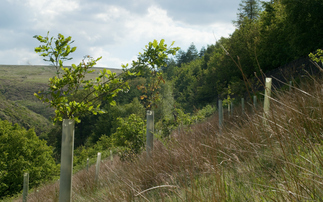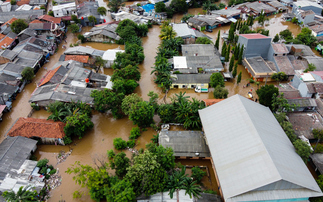It's been a tumultuous year for the green economy - but beyond the depressing headlines there has been much to celebrate
In her brilliant and at times depressingly plausible Maddaddam trilogy, the novelist Margaret Atwood conjures up a dystopian future littered with the most intriguing of throwaway references nodding to humanity's simultaneous potential for progress and destruction. On one hand there are the genetically modified pigoons, the climate ravaged landscape, and the Church of PetrOleum, which so brilliantly skewers the missionary zeal of the fossil fuel industry's most fervent defenders with its slogans, 'solar panels are Satan's work' and 'serial killers believe in global warming' (that last one an almost direct take from a Heartland Institute billboard). But on the other hand, there are the various clean technologies that offer a scintilla of hope in this fictitious near future: the solar air-conditioning, the solar glass, the solar boats and mowers and bikes.
In the wake of the biohazard pandemic 'flood' that provides the books' backdrop, it is these solar technologies that allow the small band of survivors to cling on to the last vestiges of civilisation. But while clean energy generation obviously became a common feature of the novels' urban landscape they could not save humanity from environmental catastrophe. Clean tech progress was made, but it did not come fast enough and could not compensate for mankind's worst instincts. Catastrophe followed.
Which brings us, only half-jokingly, to a review of 2016.
One of the big flaws in environmentalism, or indeed all human movements, is that we appear programmed to understand issues and events in the binary: yes or no, leave or remain, win or lose. Similarly, we only seem able to cope with one narrative at a time. So the conventional wisdom about 2016 for anyone who shares liberal, Enlightenment values is that it has been a disaster for the environment, green business, and hopes of tackling an escalating climate crisis. A toxic, tyre yard fire, train wreck of a 12 months, defined by collapsing ecosystems, an assault on scientific reason, and a vengeful hurricane of violent extremism and nationalist political posturing that has as little respect for the environment we all share as it has for democratic norms and universal human rights.
2016 in retirement: my last @guardianweekend comic of a the year https://t.co/M4ASB8bWAh pic.twitter.com/v0lg2rLy0Y
— Stephen Collins (@stephen_collins) December 19, 2016
There is plenty of evidence to drive this narrative. Record high temperatures, record low sea ice extents, and record levels of coral bleaching scarred 2016, as the steady erosion of the planet's biodiversity continued apace. Methane emissions are spiking, we know not from where. Analysts are confidently predicting clean energy investment will fall this year, just at the point when we urgently need it to step up a gear. Too many investors continue to pump billions of dollars into coal, tar sand, and other high carbon infrastructure that is simply incompatible with decarbonisation goals. Brexit may end up ushering in an era of free trading, tech-savvy entrepreneurialism, but even its most ardent admirers have to (privately) admit it also carries with it the risk of 'race to the bottom' degraded environmental standards and another lost decade of economic and political turmoil.
And then, bestriding 2016 like a poorly dressed, windmill-hating, sexual assault-bragging colossus, there is one Donald J. Trump. His contempt for common standards of decency is matched by his contempt for scientific integrity and an environment that he now threatens to despoil for no better reason than those offered by a check list of flawed and disproved climate sceptic talking points.
It is easy to despair and conclude Atwood's dystopian vision is less of a novel and more a credible forecast for the future of humanity.
But it is not that simple. There is a counter narrative and, if you are willing to look, it is just as compelling as the bleak received wisdom that has dominated the second half of 2016. This year has also seen staggering achievements from across the green economy and the political sphere.
In a decade's time it remains entirely possible the Trump presidency will be regarded as an unpleasant blip, a final belch of noxious nativism before a new interconnected, environmentally aware millennial generation got their act together.
Again, there is plenty of evidence to drive this narrative. From a business perspective the biggest story of the year should have been the flurry of ultra-low solar, offshore wind, and energy storage cost records that were set from the Middle East to Chile and back again via Denmark and the US. Plummeting costs meant clean energy deployment records will be set this year, even as overall investment levels stall. Meanwhile, the high profile brands that ignite and shape corporate trends - WalMart, Kering, Coca-Cola, HSBC, Sony, et al - rushed to sign up to science-based emissions targets and 100 per cent renewable energy goals, not out of altruism, but because they could see the direction in which the cost curves and risk profiles were moving.
From a technology perspective, electric vehicle adoption outstripped expectations and smart grids began to scale. Plans for tidal generators and high altitude kites moved forward. If you look at both the ambition and the technical viability of the integrated renewables-powered infrastructure Elon Musk is proposing, the Master Plan, Part Deux that he published this year could be the most important corporate document of the 21st century.
Politicians surpassed all expectations in ratifying the Paris Agreement faster than any international treaty in UN history, not out of some misguided attempt at gesture politics, but because they recognised that a growth path that cauterised the planet and choked their cities was no longer sustainable. The world's largest ever marine protection zone was approved, President Obama used every trick in the book to delay Trump's 'drill, baby, drill' fixation, and a new mechanism for tackling aviation emissions was agreed. Mark Carney and Michael Bloomberg presented an unanswerable argument to the financial markets as to why climate risks need to be disclosed and managed. And all the data suggests that for the third year in a row global greenhouse gas emissions remained flat, even as the economy grew.
In the UK, solar and wind power records toppled, coal was forced off the grid for the first time in over 150 years, investment in electric vehicles was increased, and, like it or loath it, approval was granted to the biggest low carbon energy project in a generation at Hinkley Point. This trend should continue, especially in light of the way Theresa May quickly squashed the hopes of the handful of parliamentary climate sceptics by ratifying the Paris deal and backing a new wave of decarbonisation efforts within weeks of making it to Number 10.
Seventy per cent of US voters want the country to remain signed up to the Paris Agreement, while on this side of the Atlantic an even higher proportion have rejected the vocal cottage industry of clean energy critics and continue to back investment in renewables. Concern about air pollution globally is now as visible as Beijing's smog and will prove just as hard to shift. It might not amount to much, but I found the news that Planet Earth 2 beat the X Factor finals in the ratings strangely heartening. As Lord Deben noted recently, "environmentalists must stop behaving as if we are perpetually in a minority".
The obvious question going into 2017 is which of these two competing narratives will win out. But again, it is not that simple. It's not that binary.
The lesson from 2016 seems to be that both visions of the future can win out for some time yet and probably will.
I have long harboured a quiet fear that the green business movement labours under the misapprehension that once certain tipping points are reached decarbonisation will become, somehow, easy. That once solar and wind power is cheaper than fossil fuels and backed by energy storage and smart grids the market will do its job and drive a rapid transition to these essential technologies. That once clean technologies wrestle power from the Petrostates that have been at the root of so much instability for much of the past century we will all live in peace and harmony. That once smart, automated technologies are delivered at scale our cities will become smooth, hyper-efficient and clean citadels of productivity, leisure, and happiness. 'Sure', environmentalists told themselves, 'there would be some teething problems along the way, but they could be easily smoothed out through a 'just transition' and clever policy making'.









